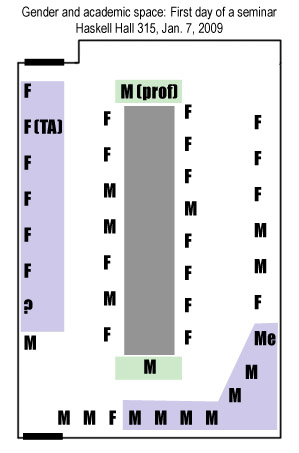Perhaps it is necessary, to be a good sociologist, to combine some dispositions associated with youth, such as a certain force of rupture, of revolt, of social “innocence,” and others more commonly associated with old age, such as realism, and the capacity to confront the rough and disappointing realities of the social world.
I believe that sociology does exert a disenchanting effect, but this, in my eyes, marks a progress toward a form of scientific and political realism that is the absolute antithesis of naive utopianism. Scientific knowledge allows us to locate real points of application for responsible action; it enables us to avoid struggling where there is no freedom—which is often an alibi of bad faith—in such a manner as to dodge sites of genuine responsibility. While it is true that a certain kind of sociology, and perhaps particularly the one that I practice, can encourage sociologism as submission to the “inexorable laws” of society (and this even though its intention is exactly the opposite), I think that Marx’s alternative between utopianism and sociologism is somewhat misleading: there is room, between sociologistic resignation and utopian voluntarism, for what I would call a reasoned utopianism, that is, a rational and politically conscious use of the limits of freedom afforded by a true knowledge of social laws and especially of their historical conditions of validity. The political task of social science is to stand up against irresponsible voluntarism and fatalistic scientism, to help define a rational utopianism by using the knowledge of the probable to make the possible come true. Such a sociological, that is, realistic, utopianism is very unlikely among intellectuals. First because it looks petty bourgeois, it does not look radical enough. Extremes are always more chic, and the aesthetic dimension of political conduct matters a lot to intellectuals.
(Invitation to Reflexive Sociology, 196-7)
Month: January 2009
Bad academic writing as status performance
From “On Intellectual Craftsmanship,” an essay from The Sociological Imagination that I love:
In many academic circles today anyone who tries to write in a widely intelligible manner is liable to be condemned as a ‘mere literary man’ or, worse still, ‘a mere journalist.’ Perhaps you have already learned that these phrases, as commonly use, only indicate the spurious inference: superficial because readable. The academic man in America is trying to carry on a serious intellectual life in a social context that often seems quite set against it. His prestige must make up for many of the dominant values he has sacrificed by choosing an academic career. His claims for prestige readily become tied to his self-image as a ‘scientist.’… It is this situation, I think, that is often at the bottom of the elaborate vocabulary and involved manner of speaking and writing. It is less difficult to learn this manner than not. It has become a convention–those who do not use it are subject to moral disapproval.
…Desire for status is one reason why academic men slip so readily into unintelligibility. And that, in turn, is one reason why they do not have the status they desire. A truly vicious circle–but one out of which any scholar can easily break.
Continue reading “Bad academic writing as status performance”
The university and skin

this is the university’s skin. at the university of illinois-chicago. some building on the south side of roosevelt road. the branches creeping up across the brick and flung in the sun while the wall is in shadow, the brick stained and blurred and colored, the brick covered by creeping vines, the vines dripping down as if the blood of the bricks were pouring out through the mortar, the snow settled into the vines like cowbirds nesting in places they didn’t build.
Fish vs. Veblen on instrumentalism
Stanley Fish argues directly against an instrumentalist view of higher education:
I have argued that higher education, properly understood, is distinguished by the absence of a direct and designed relationship between its activities and measurable effects in the world.
This is a very old idea that has received periodic re-formulations. Here is a statement by the philosopher Michael Oakeshott that may stand as a representative example: “There is an important difference between learning which is concerned with the degree of understanding necessary to practice a skill, and learning which is expressly focused upon an enterprise of understanding and explaining.”
Understanding and explaining what? The answer is understanding and explaining anything as long as the exercise is not performed with the purpose of intervening in the social and political crises of the moment, as long, that is, as the activity is not regarded as instrumental – valued for its contribution to something more important than itself.
This seems to me not very well phrased, because the distinction between an institutional ideal (which is really what this is about) and institutional reality is not well established; and “instrumentalism” is very clumsily formulated. Fish mentalistically defines being “instrumental” as a matter of purpose or intention; while of course not everything that’s intended to be “useful” actually ends up being useful, and purposes are not often as monolithic as Fish makes them out to be. Is my intrinsic enjoyment of a bag of potato chips, to take the most laughable example, diminished or even altered by the fact that eating is also instrumentally useful for avoiding weakness and eventual death by starvation? Not really; contra Fish, something can be instrinsically valuable while also being useful for some other end, even when that “other end” is, abstractly, far more important than the immediately valuable experience of, say, chewing up crisp little ovals of grease and salt. Purposes can be multiple with regard to a given activity, whose “intrinsic” merits, moreover, aren’t automatically distorted by an instrumental attitude projected onto it. Extrinsic and intrinsic value, instrumentalism vs value en soi, are not mutually exclusive. And Fish is wrong to imagine that scholastic “understanding and explaining” are automatically distorted the minute that someone starts having an intention of “intervening in social crises,” or that the academic merits of academic knowledge are incompatible with their having some other function, like job training.
Faced with demands for higher education to be “relevant” or “engaged,” either by producing a better corporate workforce as business leaders might want, or by teaching social justice as progressive activists would prefer — faced with these demands, anyway, Fish retreats into the argument that “higher education has no use; it is just intrinsically valuable.” It strikes me that this is actually an strangely deceptive move, because as a professor, higher education is obviously, trivially useful: Fish stands to gain an obvious utility — in fact a paycheck! — from the higher education that he argues is a “determined inutility.” Here is the unspoken reality of Fish’s argument: academic knowledge is useless to everyone except those faculty who are paid to reproduce it.
The fragility of the knowledge society
I don’t really believe that we live in a “knowledge society.”
Technocrats say we live in a knowledge society. Educators and politicians sometimes say we live in a knowledge society. Sometimes they’re trying to say: a world where formal knowledge from the education and research sector is crucial to social success, economic production, and the like. OK, education is a means of getting jobs, and a marker of social distinction. Scientific research is sometimes very politically involved (paradigmatically, the Manhattan Project). None of that seems to add up to a social order where “knowledge” is the foremost concern, mightiest tool and dominant value.
Contradictions of authority in radical pedagogy
In reading about “politics of knowledge” today I was reminded of a horribly unresolved issue: the contradictions of authority in radical pedagogy. Let me quote a classic case from Saundra Gardner, Cynthia Dean and Deo McKaig’s 1987 article, “Responding to Differences in the Classroom: The Politics of Knowledge, Class, and Sexuality.”
Because this was my first officially designated women’s studies course, I thought it had to be “truly feminist” in content and form… Instead of being the source of knowledge and socially distant, I would become a peer and facilitator of knowledge. Thus, I perceived, as have others, that the “truly feminist” classroom is one in which I would give up my official trappings, merge with the class, and, in the classic sense of “instructor,” become invisible.
By playing such a passive role, I set the stage for the following dynamic that emerged early in the semester. The feminist majority, or those students with a strong background in feminism, began to use their knowledge as a source of power. As a group, they were articulate and dominated the class discussions. They often talked at rather than with the other students and, as a consequence, effectively silenced the nonfeminist minority. Thus, rather than sharing ideas and learning from each other, the students used differences in knowledge to create a distinct hierarchy in the classroom, with knowledge being a source of power over others. In other words, the feminist majority defined the class as their class and soon became the new caste of ‘men,’ while the remaining ‘women’ sat passively, accepting their subjugation.
Continue reading “Contradictions of authority in radical pedagogy”
Gendered patterns of academic space
Here is a diagram of how students arranged themselves around the room, on the first day of a seminar that happened to be on space and place. It reveals an obviously gendered system of spontaneous spatial organization.

Campus monkey invasion and the inversion of academic values
According to a hilarious article in the Chronicle of Higher Ed, “a troop of 80 to 100 of [rhesus macaque] monkeys have terrorized the campus [of the All India Institute of Medical Sciences] for several years, entering waiting rooms, biting people, and grabbing food from patients and visitors.” Apparently the administrators have tried to have them caught, but unsuccessfully; and have tried to frighten them away with other monkeys, but that hasn’t worked either. And the article concludes on an even darker note:
As if the monkeys weren’t bad enough, a new problem recently visited itself upon the institute: stray dogs that attack doctors returning to their dorms late at night. A letter of complaint from the institute’s faculty association says the dogs run through the teaching block, the wards, and the operating theaters. “The excreta can be seen all over, all the time,” the letter says. “It is the worst possible start to the day.”
Continue reading “Campus monkey invasion and the inversion of academic values”
Masculine domination and academic discourse, or, do males speak first in the classroom?
This is going to be crude and quantitative, but I want to give a bit of concrete evidence bearing on a trend that, I suppose, must already be subjectively apparent to everyone who pays attention to gender in academic life: the tendency for males to speak first, or in particular, to be the first to volunteer comments in large public discussions. This obviously isn’t the case always and everywhere, and must be shaped by a large number of variables: group size, topic, distribution of interest and topical expertise, social rank and authority, and degree of acquaintanceship or shared social belonging, to name a few. For instance, I don’t notice this trend when the anthropology faculty, who are colleagues well known to each other, are responding to guest speakers at the weekly department seminar. But I did notice this trend very strongly at a public lecture by Bernie Sanders in December, where about the first ten speakers were all male, while only a very few women got to comment at all, and they were towards the very end of the line.
But to avoid making claims based purely on the hazardous results of personal experience, let me report the following.
Academic despotism, praised in iambic tetrameter
Department Head
“His kingdom isn’t large, but still
He rules it with a royal will
And, as his colleagues sometimes moan,
Needs but a scepter and a throne.
Part teacher only, he’s between
A full professor and a dean.
More like a congressman, by rights,
He represents his field and fights
For added space and extra books,
More office space and shelves and hooks.
He counts his majors, keenly knowing
He has to make a stronger showing
Or (how his loyal heart is torn)
His budget will be sadly shorn.
Above his colleagues quite a distance,
He has a phone and two assistants
And teaches what he wants and when
And takes a day off now and then.
The students all are scared to death,
The new instructor holds his breath,
The others envy, hate, admire,
And try to guess when he’ll retire.”
-Richard Armour, 1956, College English 17(8):450. (There are other examples of this doggerel out there too.)
Let me just note that it’s interesting that the three themes of this poem are: the structure of departmental power (somewhere between monarchy and legislative bargaining); the budget and material supplies (down to the shelves and hooks); and the chair’s affective relations with colleagues and students (envy, fear, suspense, admiration…).
Theses on the value of higher education
Last month I read in the New York Times that, as the costs of college rise and rise again, “college may become unaffordable for most in U.S.” That struck me as a wretched situation.
It’s probably also false. What’s actually happening, according to another article a few weeks later, is that applications to expensive private universities are dropping, while more students are probably going to go to cheaper schools, particularly public schools. But the question remains: if fewer people got to go to college, why would that be a bad thing? Or rather, what makes higher education valuable?
I have to say I’m skeptical about most of the arguments I’ve encountered in this arena. I have an intuition that there is something worth defending, but most of the existing arguments seem deeply flawed. Here I just want to outline some critical and methodological theses that seem to demand our attention.
- Sound arguments are neither necessary or sufficient for a thing’s existence or value. Higher education does not stand or fall on the basis of a sound argument in its favor. Many, probably most, teachers and students have no good argument to justify their activity, and that doesn’t necessarily make a difference. (Social practice, mercifully, need not be founded on philosophically valid premises.) Insofar as going to college has become a customary part of the life course for Americans of a certain social class, it can just become something that one does, almost as a matter of ritual. Does one go to college because it is valuable to do so, or does it come to seem valuable because one does it?
Universities and dawn

At sunrise, even the droll ornamental lakes of the university acquire a certain glimmer. The pond weeds become shadows. The shadows wash over the shores of the lake and hide them, which is much for the better, as this lake is populated by geese who have draped the banks with their droppings, each one about the size of a skinned baby carrot. They number in the thousands. Consequently, the mirrored sheen of this fake pond offers only a very incomplete simulation of a beautiful natural scene.